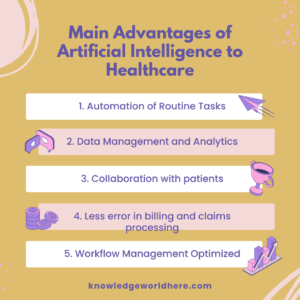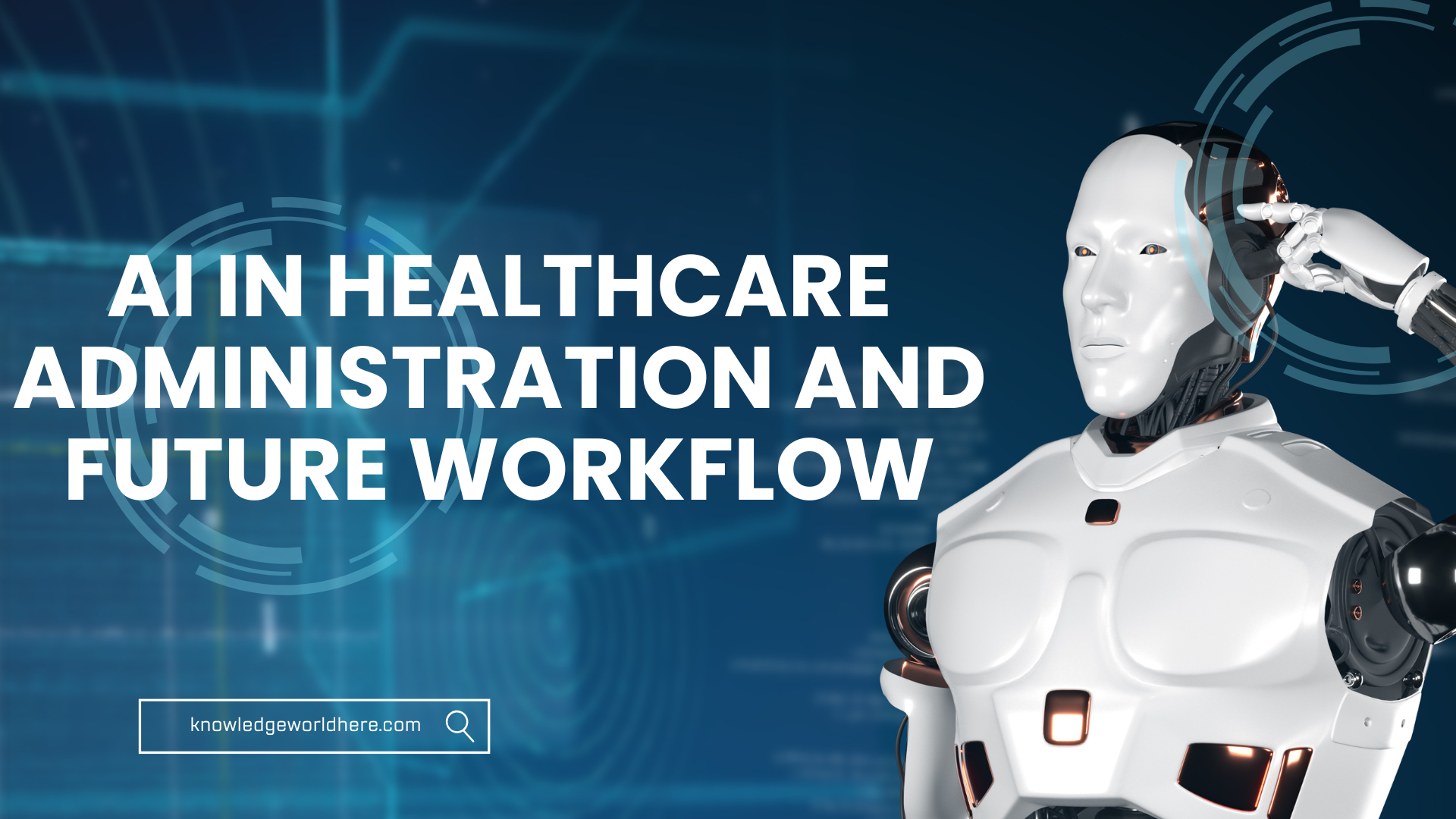This revolution through AI in the healthcare system is transforming and changing how hospitals and clinics work, streamline workflows, and change patient care through its wide potentials. In this light, artificial intelligence in healthcare will bring more efficiency and innovation as the health systems make administrative procedures faster, smarter, and more effective.
Healthcare AI employs machine learning, data analytics, natural language processing, and other AI tools to help manage the administrative burden of healthcare. From scheduling appointments to insurance claims, AI is revolutionizing healthcare administration by reducing repetitive tasks, minimizing human error, and providing data-driven insights.
For example, AI may predict no-show patients, allowing healthcare providers to schedule better. Operational efficiencies such as these allow artificial intelligence in healthcare to free providers to care for more patients and less on paperwork.

Main Advantages of Artificial Intelligence to Healthcare Administration
Some of the advantages of artificial intelligence in healthcare include precision, time saving, and resource utilization. Let’s go closer to some of them:
1. Automation of Routine Tasks
Automating mundane tasks therefore reduces the workload of healthcare professionals, leaving them more time to spend on patients. More importantly, AI can perform appointment scheduling, data entry, and claim processing much more accurately than normal manual procedures, thus reducing administrative costs.
2. Data Management and Analytics
Artificial intelligence can digest large datasets at unprecedented speeds; thereby allowing health practitioners to make decisions based on data, predict trends in the market place, and resource allocation. For instance, AI can analyze a certain admission data for a hospital and make advance forecasting of the demand of certain services, thereby making resource-allocation more effective.
3. Collaboration with patients
AI-powered chatbots and virtual assistants can answer the questions of patients, remind patients about their medication, and provide health tips for enhancing patient experience and reducing health staff burden. Moreover, AI systems in healthcare administration offer patients personalized experiences and make patients feel connected and informed.
4. Less error in billing and claims processing
Artificial intelligence in healthcare reduces errors in billing and insurance claims through verification and accurate processing of information. The AI algorithms are able to identify anomalies in billing patterns, which in turn reduces fraudulent claims and allows hospitals to be fairly compensated for their services.
5. Workflow Management Optimized
AI-based workflow management systems help healthcare administrators optimize patient flow, plan staff shifts, and allocate other resources most effectively. An example would be in an emergency department, where AI can predict peak periods, helping administrators prepare ahead of time.
Read More: https://knowledgeworldhere.com/healthcare/vaccine-schedule-to-follow-for-your-child
Applications of Artificial Intelligence in Future Healthcare Workflow
More and more, the future workflow of healthcare administration will depend on artificial intelligence to provide faster, more efficient, cost-effective, and accurate processes. Some of the areas that are expected to be applied include:
1. Predictive analytics for operational efficiency
The power of AI will enable health organizations to predict trends and volumes of patients and thereby anticipate resource needs. As such, hospitals can anticipate the seasonal influx of patients using artificial intelligence in health and adjust their staffing.
2. Automation of patient registration and intake
AI will definitely make it easier for the intake process for patients. As AI enables the automation of patient registration, wait times and the possibility of human error is reduced, thereby allowing access to correct information about the patient by the healthcare provider. This innovation will eliminate the use of paper forms and ensure integration of data into EHRs.
3. AI-based scheduling systems
In the near future, artificial intelligence in the healthcare sector could fully automate scheduling, optimizing appointment times based on patient history, provider availability, and available hospital resources. AI-based scheduling systems could also ensure a minimum no-show rate by sending timely reminders to patients and suggesting rescheduling options in case of conflicts.
4. AI for Enhanced Medical Records End
The most critical challenge in clinical documentation is the time that could be devoted to patient care. With AI, the process can be streamlined because it would be able to transcribe conversations between doctors and patients, summarize key points, and automatically update EHRs. This would not only save time but also minimize the likelihood of errors in documentation.
5. Better Communication between Departments
The role of artificial intelligence in healthcare is also that it facilitates better communication between departments by ensuring data flows smoothly across the organization. AI can act as an intermediary, identifying and relaying critical information to the relevant department, thus reducing delays and enhancing overall patient care coordination.
6. AI decision support system
Definitely, future healthcare workflows will include AI-powered decision support systems to assist healthcare providers in their decision-making processes. Such systems analyze patient data, medical literature, and treatment protocols to give doctors and nurses real-time recommendations that help them deliver quality care on time.
7. Telemedicine and remote patient monitoring
AI will continue to support telemedicine and remote patient monitoring, which allows the healthcare provider to manage a patient’s care from another location. AI-driven platforms can monitor a patient’s vital signs, look for early symptoms, and intervene in time, which has proven to be especially useful for patients in rural or underserved areas.
This revolution through AI in the healthcare system is transforming and changing how hospitals and clinics work, streamline workflows, and change patient care through its wide potentials. In this light, artificial intelligence in healthcare will bring more efficiency and innovation as the health systems make administrative procedures faster, smarter, and more effective.
Healthcare AI employs machine learning, data analytics, natural language processing, and other AI tools to help manage the administrative burden of healthcare. From scheduling appointments to insurance claims, AI is revolutionizing healthcare administration by reducing repetitive tasks, minimizing human error, and providing data-driven insights.
For example, AI may predict no-show patients, allowing healthcare providers to schedule better. Operational efficiencies such as these allow artificial intelligence in healthcare to free providers to care for more patients and less on paperwork.
Main Advantages of Artificial Intelligence to Healthcare Administration
Some of the advantages of artificial intelligence in healthcare include precision, time saving, and resource utilization. Let’s go closer to some of them:
1. Automation of Routine Tasks
Automating mundane tasks therefore reduces the workload of healthcare professionals, leaving them more time to spend on patients. More importantly, AI can perform appointment scheduling, data entry, and claim processing much more accurately than normal manual procedures, thus reducing administrative costs.
2. Data Management and Analytics
Artificial intelligence can digest large datasets at unprecedented speeds; thereby allowing health practitioners to make decisions based on data, predict trends in the market place, and resource allocation. For instance, AI can analyze a certain admission data for a hospital and make advance forecasting of the demand of certain services, thereby making resource-allocation more effective.
3. Collaboration with patients
AI-powered chatbots and virtual assistants can answer the questions of patients, remind patients about their medication, and provide health tips for enhancing patient experience and reducing health staff burden. Moreover, AI systems in healthcare administration offer patients personalized experiences and make patients feel connected and informed.
4. Less error in billing and claims processing
Artificial intelligence in healthcare reduces errors in billing and insurance claims through verification and accurate processing of information. The AI algorithms are able to identify anomalies in billing patterns, which in turn reduces fraudulent claims and allows hospitals to be fairly compensated for their services.
5. Workflow Management Optimized
AI-based workflow management systems help healthcare administrators optimize patient flow, plan staff shifts, and allocate other resources most effectively. An example would be in an emergency department, where AI can predict peak periods, helping administrators prepare ahead of time.
Read More: https://knowledgeworldhere.com/healthcare/vaccine-schedule-to-follow-for-your-child
Applications of Artificial Intelligence in Future Healthcare Workflow
More and more, the future workflow of healthcare administration will depend on artificial intelligence to provide faster, more efficient, cost-effective, and accurate processes. Some of the areas that are expected to be applied include:
1. Predictive analytics for operational efficiency
The power of AI will enable health organizations to predict trends and volumes of patients and thereby anticipate resource needs. As such, hospitals can anticipate the seasonal influx of patients using artificial intelligence in health and adjust their staffing.
2. Automation of patient registration and intake
AI will definitely make it easier for the intake process for patients. As AI enables the automation of patient registration, wait times and the possibility of human error is reduced, thereby allowing access to correct information about the patient by the healthcare provider. This innovation will eliminate the use of paper forms and ensure integration of data into EHRs.
3. AI-based scheduling systems
In the near future, artificial intelligence in the healthcare sector could fully automate scheduling, optimizing appointment times based on patient history, provider availability, and available hospital resources. AI-based scheduling systems could also ensure a minimum no-show rate by sending timely reminders to patients and suggesting rescheduling options in case of conflicts.
4. AI for Enhanced Medical Records End
The most critical challenge in clinical documentation is the time that could be devoted to patient care. With AI, the process can be streamlined because it would be able to transcribe conversations between doctors and patients, summarize key points, and automatically update EHRs. This would not only save time but also minimize the likelihood of errors in documentation.
5. Better Communication between Departments
The role of artificial intelligence in healthcare is also that it facilitates better communication between departments by ensuring data flows smoothly across the organization. AI can act as an intermediary, identifying and relaying critical information to the relevant department, thus reducing delays and enhancing overall patient care coordination.
6. AI decision support system
Definitely, future healthcare workflows will include AI-powered decision support systems to assist healthcare providers in their decision-making processes. Such systems analyze patient data, medical literature, and treatment protocols to give doctors and nurses real-time recommendations that help them deliver quality care on time.
7. Telemedicine and remote patient monitoring
AI will continue to support telemedicine and remote patient monitoring, which allows the healthcare provider to manage a patient’s care from another location. AI-driven platforms can monitor a patient’s vital signs, look for early symptoms, and intervene in time, which has proven to be especially useful for patients in rural or underserved areas.
Conclusion
Artificial intelligence in healthcare administration is actually changing processes to operate better and more efficiently to respond to patients. With promises of automation of tasks, data-driven insights, and optimization of resources, it’s proving to be really useful for designing the future of healthcare administration. Although some issues, such as data privacy, and the necessity for a system integration may prevail, the extent of artificial intelligence in the health sector is still very significant. As technology advances, more innovative solutions will be advanced to shape healthcare administration so that operational efficiency improves and adds value to the patient experiences.

